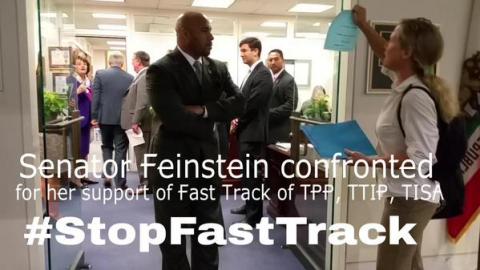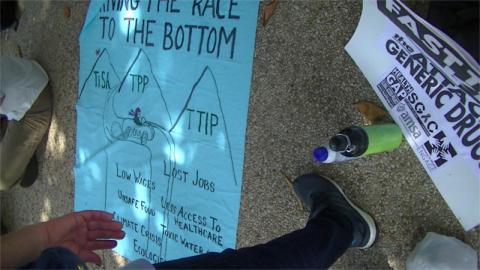Sen Feinstein confronted at TPP fast-track clears cloture vote
On the 23ed of June, the Senate voted to cut off debate on the "fast-track" bill for the TPP, TISA, and TTIP trade treaties. The proposal only needs 50 votes to pass in Wednesday's final vote. Beyond Extreme Energy confronted Sen Dianne Feinstein in her office over her support for TPP fast-track while other activists took up a position on the corner of the Capitol grounds. Just after 11:30AM, the 60th vote to cut off debate was cast.
Environmentalists are seriously concerned about TPP and TTIP provisions that could subject jurisdictions that ban or limit gas fracking, tar sands, and similar extreme extraction to liablity to foreing corporations for their "lost" profits. The TPP alone would extend NAFTA style "investor state dispute reolution" lawsuits heard by corporate lawyers instead of judges to at least 20 countries. As one example, if this passes, Sumitomo in Japan might be able to sue Calvert County, MD if the government there ever shuts down Dominion's fracked gas export plant or stop construction. Not being a corporate lawyer, my reading of the "Investment" chapter of the TPP as captured by Wikileaks
https://wikileaks.org/tpp-investment/WikiLeaks-TPP-Investment-Chapter.pdf
cannot determine if loss of a seller would be enough for a NAFTA style lawsuit. Certainly a local ban on fracking gas could allow foreign gas frackers whose projects began prior to the ban to sue claiming "expropriation," citing "national treatment" and existing ugly trends in US "taking" cases involving environmental regulations. The "definitions" chapter of this document explicitly mentions both "natural resource" extraction and infrastructure such as electrical generation.
Passage of the TPP is highly probable unless fast-track is stopped or the negotiations hit a last-minute snag. This would be utterly catastrophic in so many ways. One activist outside the US Capitol said it would be "game over" for stopping climate change. This would be due to the inablity to place any restrictions on export of tars sands, oil, fracked gas, and coal. There are also many other issues, such as the rapid growth of sweatshops while union factories close and a stifling regime of internet censorship enforced by ISP's. The Internet censorship would directly interfere with organization against any of the other crimes the TPP and other trade deals would promote.



